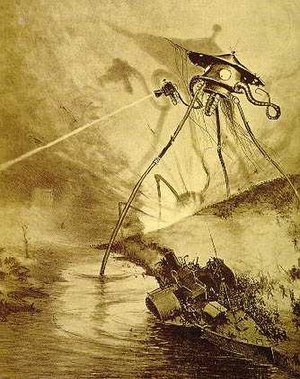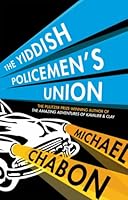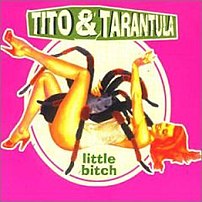Number One in an occasional series.
So I thought I would take a look, when time and opportunity permit, to read and review the
early stories of writers that I rate.
 Image via Wikipedia
Image via Wikipedia
I think I'm doing to make myself feel better, in that I'll find that some of their early stuff was as bad as my stuff and therefore kid myself that my career, such as it is, resembles theirs enough to give me hope that I can make this work. I suspect I'll find it's a bit more complicated than that.
Justification over, I'll move on to the first choice which is "
Fragments of a Hologram Rose" by
William Gibson. Even before I read it, again, I found out two startling facts. First, it was published in
1977. When I was a mighty ten. And second that
William Gibson is over 60 years old.
That
1977 publication date knocked me out. That's why, I guess, the punk label gets applied to stuff done in the same style because of the chronological suture with the proper punk. Hmm.
It was published in
UnEarth 3. Which, I read, was a short-lived SF mag (1977-79) and he got paid $23 for it. Holy crap there is a
copy available
still to buy. How about that. It was
edited by Jonathan Ostrowsky-Lantz and John M. Landsberg. JML wrote a few stories and a couple of novels and JOL didn't. This
story knocked me out. Look for "What baggery is this?"
On to the story. Which is really short, about 2,000 words or so I'd guess. And its pretty damn good. Whole and polished. No stuttering lights here, just full beam all the way. Pretty much all the elements in later Gibson are there in the first instar. The neat technology, the astonishing attention to detail, and the human element too. It's all about the end of a relationship and the tech is used to underline just what is lost and how it all went wrong. Poignant too.
Some of the names that crop up in later Gibson works are there too - Sendai, in particular.
I bought a copy of Burning Chrome, the anthology, to get at Fragments and I've picked through a few of the stories. Most of which are good, some great and some, like the title work, out and out fab.
In the spirit of wanting to learn from reading I'll mention what I have spotted. And this builds on something I noticed last week. Details are important, essential even, to establishing that sense of place.
 Image by Martin Kingsley via Flickr
Image by Martin Kingsley via Flickr
Though one passage, in New Rose Hotel, did make me snort it seemed so over the top. This is it
"He'd found a German girl with a taste for conservative loden and riding boots polished the shade of a fresh chestnut."
Fabulous. For reference
loden is that houndstoothy, twilly cloth seen in traditional German costumes.
What I also picked up on though was their simplicity. The profundity of the stories comes from how straight-forward they are. They do not attempt to be clever before they are clear. I've often been accused of doing the opposite. Good lessons from Mr Gibson. He'll go far.
 Image via Wikipedia
Image via Wikipedia![Reblog this post [with Zemanta]](http://img.zemanta.com/reblog_e.png?x-id=417c6250-9429-42aa-848d-6b33e3a407d8)



![Reblog this post [with Zemanta]](http://img.zemanta.com/reblog_e.png?x-id=84f150e6-e3b8-4546-8d94-7575f1a4f66f)


![Reblog this post [with Zemanta]](http://img.zemanta.com/reblog_e.png?x-id=54eb694b-eabd-4590-b736-179424c55798)




![Reblog this post [with Zemanta]](http://img.zemanta.com/reblog_e.png?x-id=05b7622f-1dc4-4124-b712-355b14bbcb2b)


![Reblog this post [with Zemanta]](http://img.zemanta.com/reblog_e.png?x-id=b67ae5bc-e400-44cc-84c5-3dfa6da6d51a)




![Reblog this post [with Zemanta]](http://img.zemanta.com/reblog_e.png?x-id=4e73e20c-9dbc-4fb1-883a-a9bcb940c507)


![Reblog this post [with Zemanta]](http://img.zemanta.com/reblog_e.png?x-id=dd92e402-3fe3-47e9-aacb-758eaf1fe8ec)


![Reblog this post [with Zemanta]](http://img.zemanta.com/reblog_e.png?x-id=068179c3-be86-4d6d-8bea-0f379f1e175f)


![Reblog this post [with Zemanta]](http://img.zemanta.com/reblog_e.png?x-id=8121e099-a90f-4c02-a147-b7b1c8a403ed)


![Reblog this post [with Zemanta]](http://img.zemanta.com/reblog_e.png?x-id=ded940ca-2be7-4f76-984b-ca2c9cd962fe)

![Reblog this post [with Zemanta]](http://img.zemanta.com/reblog_e.png?x-id=ef89b052-b6e9-4ed7-84db-d07dfdf857f8)

![Reblog this post [with Zemanta]](http://img.zemanta.com/reblog_e.png?x-id=d35dca08-439e-47df-a851-05964239b0a8)

![Reblog this post [with Zemanta]](http://img.zemanta.com/reblog_e.png?x-id=ab7f20cd-4971-4cb6-995c-59b0ef6e115b)
